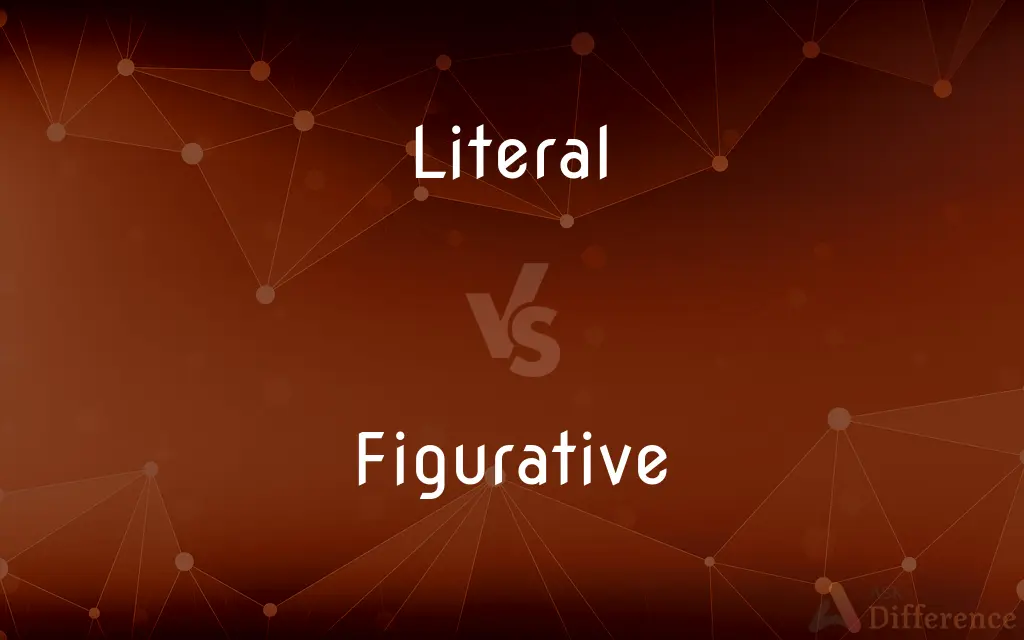Literal vs. Figurative — What's the Difference?
By Tayyaba Rehman & Urooj Arif — Updated on April 21, 2024
Literal language conveys exact meanings, while figurative language uses metaphors, similes, and idioms to suggest non-literal interpretations.

Difference Between Literal and Figurative
Table of Contents
ADVERTISEMENT
Key Differences
Literal language is direct and adheres to the original meaning of words or phrases. For example, saying "it's raining cats and dogs" literally would imply animals falling from the sky, which is not the intended meaning. Whereas figurative language employs creative expressions like metaphors, similes, and hyperbole to convey complex ideas, emotions, and abstract concepts in a relatable way.
When someone uses literal language, they are usually understood immediately, as there is no hidden meaning behind their words. "The grass is green" means just that—the grass is colored green. On the other hand, figurative language often requires interpretation and understanding of cultural or contextual nuances; "green with envy" doesn’t mean someone has turned green, but rather that they are very jealous.
Literal language is straightforward, making it essential for clear communication, especially in factual and technical contexts. It leaves little room for misunderstanding. On the other hand, figurative language adds depth and flavor to our conversations and literature, making it crucial for artistic and poetic expressions.
In literature, literal descriptions can provide clear imagery or factual details, grounding the reader in reality. Whereas, figurative language enhances the text by adding symbolic meanings and emotional resonance, which can make the literature more engaging and thought-provoking.
The use of literal language can be seen in manuals, textbooks, and legal documents where precise and unambiguous language is paramount. Conversely, figurative language dominates genres like poetry, novels, and songs, where the aim is to evoke emotions and paint vivid images through words.
ADVERTISEMENT
Comparison Chart
Definition
Expresses words in their standard meanings.
Uses creative expressions beyond standard meanings.
Purpose
To communicate exact, straightforward information.
To enhance meaning, provoke thought, or evoke emotions.
Examples
"The sky is blue."
"The sky is a blanket of blue."
Usage Context
Technical writing, news reporting, instructions.
Literature, speeches, everyday conversation.
Interpretation
Taken at face value, no deeper meaning.
Requires understanding of context and culture.
Compare with Definitions
Literal
Not exaggerated.
He took her words literally and didn’t look for any hidden meaning.
Figurative
Representational, as opposed to literal.
She described her feelings of loneliness as a dark cloud, a figurative expression.
Literal
True to the original meaning.
His answer to the question was literal and straightforward.
Figurative
Not literal; metaphorical.
To say he exploded with rage is a figurative use of the word exploded.
Literal
Real or actual.
The literal interpretation of her statement would lead to confusion.
Figurative
Involving a figure of speech like a metaphor or simile.
He has a fiery temper is a figurative way to describe someone’s anger.
Literal
Stating facts without any embellishment.
She literally spilled the beans, meaning the beans were all over the floor.
Figurative
Symbolically expressing deeper meanings.
The poem uses water as a figurative symbol of purification.
Literal
Adhering strictly to fact.
They followed the recipe with literal precision.
Figurative
Using figures of speech to be more effective.
Using heart of stone figuratively means being unfeeling.
Literal
Conforming or limited to the simplest, nonfigurative, or most obvious meaning of a word or words.
Figurative
Departing from a literal use of words; metaphorical
A figurative expression
Literal
Word for word; verbatim
A literal translation.
Figurative
(of an artist or work of art) representing forms that are recognizably derived from life.
Literal
Avoiding exaggeration, metaphor, or embellishment; factual; prosaic
A literal description.
A literal mind.
Figurative
Based on or making use of figures of speech; metaphorical
Figurative language.
Literal
Consisting of, using, or expressed by letters
Literal notation.
Figurative
Containing many figures of speech; ornate.
Literal
A letter or symbol that stands for itself as opposed to a feature, function, or entity associated with it in a programming language
$ can be a symbol that refers to the end of a line, but as a literal, it is a dollar sign.
Figurative
Represented by a figure or resemblance; symbolic or emblematic.
Literal
Exactly as stated; read or understood without additional interpretation; according to the letter or verbal expression; real; not figurative or metaphorical, and etymonic rather than idiomatic.
The literal translation is "hands full of bananas" but it means "empty-handed".
Figurative
Of or relating to artistic representation by means of animal or human figures.
Literal
Following the letter or exact words; not free; not taking liberties
A literal reading of the law would prohibit it, but that is clearly not the intent.
Figurative
Of use as a metaphor, simile, metonym or other figure of speech, as opposed to literal; using figures; as when saying that someone who eats more than they should is a pig or like a pig.
Literal
(theology) (broadly) That which generally assumes that the plainest reading of a given scripture is correct but which allows for metaphor where context indicates it; (specifically) following the historical-grammatical method of biblical interpretation
Figurative
Metaphorically so called.
Literal
(uncommon) Consisting of, or expressed by, letters (of an alphabet)
A literal equation
Figurative
With many figures of speech.
Literal
(of a person) Unimaginative; matter-of-fact
Figurative
Emblematic, symbolic; representative, exemplative
Literal
(proscribed) Used non-literally as an intensifier; see literally for usage notes.
Telemarketers are the literal worst.
Figurative
(art) representing forms recognisable in life and clearly derived from real object sources, in contrast to abstract art.
Literal
A misprint (or occasionally a scribal error) that affects a letter.
Figurative
Representing by a figure, or by resemblance; typical; representative.
This, they will say, was figurative, and served, by God's appointment, but for a time, to shadow out the true glory of a more divine sanctity.
Literal
(programming) A value, as opposed to an identifier, written into the source code of a computer program.
Figurative
Used in a sense that is tropical, as a metaphor; not literal; - applied to words and expressions.
Literal
(logic) A propositional variable or the negation of a propositional variable. Wp
Figurative
Abounding in figures of speech; flowery; florid; as, a highly figurative description.
Literal
According to the letter or verbal expression; real; not figurative or metaphorical; as, the literal meaning of a phrase.
It hath but one simple literal sense whose light the owls can not abide.
Figurative
(used of the meanings of words or text) not literal; using figures of speech;
Figurative language
Literal
Following the letter or exact words; not free.
A middle course between the rigor of literal translations and the liberty of paraphrasts.
Figurative
Consisting of or forming human or animal figures;
A figural design
The figurative art of the humanistic tradition
Literal
Consisting of, or expressed by, letters.
The literal notation of numbers was known to Europeans before the ciphers.
Literal
Giving a strict or literal construction; unimaginative; matter-of-fact; - applied to persons.
Literal
Literal meaning.
Literal
A mistake in printed matter resulting from mechanical failures of some kind
Literal
Being or reflecting the essential or genuine character of something;
Her actual motive
A literal solitude like a desert
A genuine dilemma
Literal
Without interpretation or embellishment;
A literal translation of the scene before him
Literal
Limited to the explicit meaning of a word or text;
A literal translation
Literal
Lacking stylistic embellishment;
A literal description
Wrote good but plain prose
A plain unadorned account of the coronation
A forthright unembellished style
Literal
Of the clearest kind; usually used for emphasis;
It's the literal truth
A matter of investment, pure and simple
Literal
(of a translation) corresponding word for word with the original;
Literal translation of the article
An awkward word-for-word translation
Common Curiosities
What is literal language?
Literal language means using words in their standard, original meanings without any embellishment.
What is figurative language?
Figurative language involves using creative expressions like metaphors, similes, or idioms that go beyond literal meanings to convey more complex, symbolic ideas.
Why is literal language important?
It is crucial for clear, direct communication, especially in contexts where precision and accuracy are needed, such as in technical documentation or legal matters.
Can you give an example of a figurative expression?
Saying "time is a thief" is a figurative expression suggesting time can take away life's moments, like a thief steals valuables.
Why do people use figurative language?
To add depth, emotion, and artistic flavor to speech and writing, making it more engaging and memorable.
Is figurative language used in everyday conversation?
Yes, people often use figures of speech in daily communication to express ideas more vividly or humorously.
How does one identify figurative language?
It often involves exaggerations, alterations of the literal meanings of words, or phrases that must be understood in context.
What is the difference between a metaphor and a simile?
Both are figurative devices, but a metaphor directly states one thing is another, while a simile uses "like" or "as" to compare.
Can you give an example of a literal statement?
"The car is red" is a literal statement that simply describes the car’s color.
Can literal language be ambiguous?
Rarely, as it aims to be as clear and straightforward as possible, although misunderstandings can still occur.
Are idioms considered figurative language?
Yes, idioms are a form of figurative language where the phrase’s overall meaning is different from the literal meanings of its components.
Can figurative language be used in formal writing?
Yes, but it is typically more restrained and chosen carefully to suit the formality and purpose of the text.
What role does figurative language play in poetry?
It is central to poetry, providing layers of meaning and aesthetic pleasure.
Is it possible for literal and figurative language to coexist in a single sentence?
Yes, sentences can combine both forms, often enhancing the clarity and depth of the communication.
How can understanding figurative language improve reading comprehension?
Recognizing figurative expressions helps readers grasp deeper meanings and enjoy the richness of the text.
Share Your Discovery

Previous Comparison
Bog vs. Marsh
Next Comparison
Box vs. PackAuthor Spotlight
Written by
Tayyaba RehmanTayyaba Rehman is a distinguished writer, currently serving as a primary contributor to askdifference.com. As a researcher in semantics and etymology, Tayyaba's passion for the complexity of languages and their distinctions has found a perfect home on the platform. Tayyaba delves into the intricacies of language, distinguishing between commonly confused words and phrases, thereby providing clarity for readers worldwide.
Co-written by
Urooj ArifUrooj is a skilled content writer at Ask Difference, known for her exceptional ability to simplify complex topics into engaging and informative content. With a passion for research and a flair for clear, concise writing, she consistently delivers articles that resonate with our diverse audience.














































